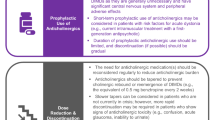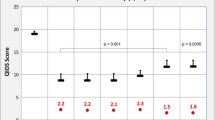Abstract
Background
Combined treatment with serotonin–reuptake inhibitors (SRI) and cognitive–behavioral therapy (CBT) is a common therapy approach for obsessive–compulsive disorder (OCD). However, it is a matter of debate whether discontinuation of SRI after combined treatment leads to relapse.
Method
Seventyfour consecutively admitted patients suffering from OCD were included in the study. Thirty–seven patients were treated with CBT alone, and 37 patients received combined CBT and SRI treatment. Of these latter patients, seventeen discontinued SRI treatment during the follow–up period (1 and 2 years after inpatient treatment). OCD symptom severity was determined by Yale–Brown Obsessive Compulsive Scale (Y–BOCS), and mood was assessed by Hamilton Depression Rating Scale (HDRS).
Results
During the initial treatment, scores for Y–BOCS (p < 0.001), HDRS (p < 0.001) and the Global Assessment of Functioning Scale (GAF) (p < 0.001) improved significantly in all groups. Reassessment two years later revealed that a) OCD symptom severity and depression scores were similar between the groups and b) discontinuation of SRI did not prompt by a recurrence of symptoms.
Conclusions
We interpret our results as suggesting that discontinuation of SRI treatment may be considered in formerly combined treated OCD patients after stable remission.
Similar content being viewed by others
References
Van Balkom AJ, Van Oppen P, Vermeulen AWA, Van Dyck R (1994) A meta-analysis on treatment of obsessive-compulsive disorder: a comparison of antidepressants, behavior therapy, and cognitive therapy. Clin Psychol Rev 14:359–381
Koran LM, Hackett E, Rubin A, Wolkow R, Robinson D (2002) Efficacy of sertraline in the long-term treatment of obsessive-compulsive disorder. Am J Psychiatry 159:88–95
Pato MT, Zohar-Kadouch R, Zohar J, Murphy DL (1988) Return of symptoms after discontinuation of clomipramine in patients with OCD. Am J Psychiatry 145:1521–1525
Ravizza L, Barzega G, Bellino S, Bogetto F, Maina G (1996) Drug treatment of obsessive-compulsive disorder: long-term trial with clomipramine and selective serotonin reuptake inhibitors. Psychopharmacol Bull 32(1):167–173
O’Sullivan G, Noshirvani H, Marks I, Monteiro W, Lelliott P (1991) Six-year follow-up after exposure and clomipramine for obsessive compulsive disorder. J Clin Psychiatry 52:150–155
Kobak KA, Greist JH, Jefferson JW, Katzelnick DJ, Henk HJ (1998) Behavioral versus pharmacological treatments of obsessive-compulsive disorder: a meta-analysis. Psychopharmacology 136(3):205–216
Hohagen F, Winkelmann G, Rasche-Räuchle H, Hand I, König A, Münchau N, Hiss H, Geiger-Kabisch C, Käppler C, Schramm P, Rey E, Aldenhoff J, Berger M (1998) Combination of BT with fluvoxamine in comparison with BT and placebo. Br J Psychiatry 173:71–78
Author information
Authors and Affiliations
Corresponding author
Rights and permissions
About this article
Cite this article
Kordon, A., Kahl, K.G., Broocks, A. et al. Clinical outcome in patients with obsessive-compulsive disorder after discontinuation of SRI treatment: results from a two–year follow–up. Eur Arch Psychiatry Clin Neurosci 255, 48–50 (2005). https://doi.org/10.1007/s00406-004-0533-y
Received:
Accepted:
Published:
Issue Date:
DOI: https://doi.org/10.1007/s00406-004-0533-y




